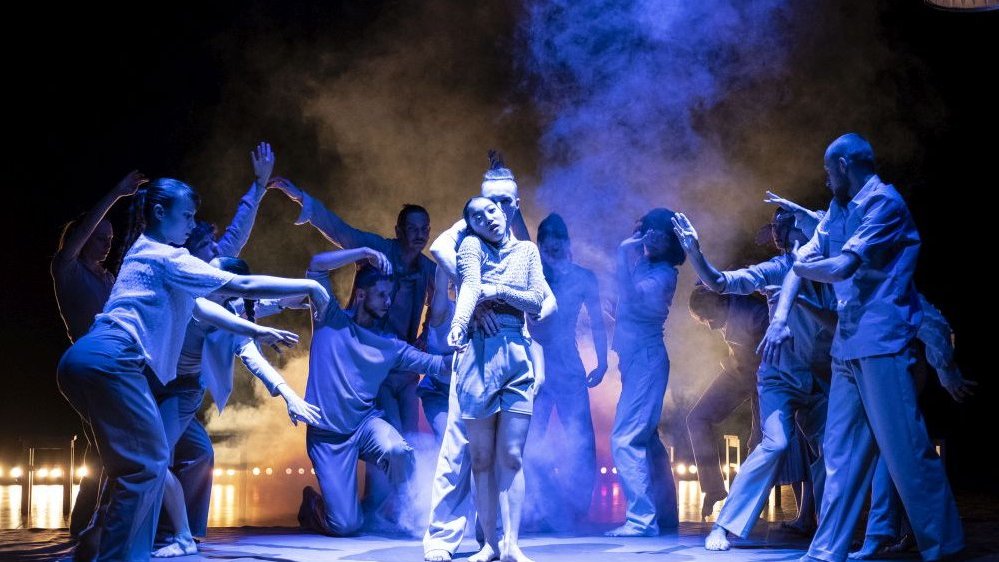Respecting memories

In observance of this anniversary season, the Polish Dance Theatre has prepared five premiere performances, a choreographic film project, as well as an array of exhibitions, and meetings with authors. Summarising the theatre's legacy is a daunting task, considering that its artistic heritage spans half a century and has been shaped by remarkable talent.
The Theatre was established in 1973 by Conrad Drzewiecki, a dancer, choreographer, and former director of the ballet company of the Grand Theatre of Poznań. In 1988, Ewa Wycichowska, prima ballerina of the Grand Theatre of Łódź, and an accomplished choreographer and educator, assumed leadership of the theatre, overseeing its operations through 27 seasons. In 2016, she was succeeded by Iwona Pasińska, the first soloist on Wycichowska's team, a choreographer with a Ph.D. in theatre studies. Reflecting on challenges of the jubilee, Pasińska emphasises that the biggest one of them is memory. Memory will indeed emerge as the central theme in the premiere that inaugurates the Polish Dance Theatre's 50th season.
"The Hat", a production brought to life by Jo Strømgren, a name familiar to patrons of the Polish Dance Theatre and one that previously contributed choreography for the theatre's 40th anniversary, is set to kick off the season. Iwona Pasińska brought Strømgren on board several years back. "As the curtain rises on the season, this premiere sets the stage for the idea of mutual respect for our memories", Pasińska explains. "The show's working title of "50 Stories for 50 Years" was distilled to "50 Stories", which then coalesced into one hat. The touching narrative behind the show holds particular significance for those grappling with constructing their history from memories. The performance delves into why we so powerfully experience events that are not even part of our own history. The Polish premiere is scheduled for 12 September, following the world premiere on 25 October in Oslo.
On 16 November, the Polish Dance Theatre will unveil another production, "The Republic of Dreams", inspired by the poetic prose of Bruno Schulz. Directed by Igor Gorzkowski and choreographed by Iwona Pasińska, this performance aspires to resonate with the essence of Man - Living History. "The Republic of Dreams" invites immersion into a world of perpetual happiness. Pasińska remarks, "We want to rekindle the audience's personal moments of happiness". Another premiere, slated for January, is designed to bring joy to the Theatre's artists and audiences alike. It is a collaborative effort between the theatre's friends, fans, dancers and guests, its premiere coming as a surprise and a big unknown.
A little more is known about "A Midsummer Night's Dream", scheduled for 23 April. Following in the footsteps of "Romeos & Julias Unplagued. Traumstadt", this production marks another collaboration between the Polish Dance Theatre and the bodytalk collective. Based on William Shakespeare's work, it features choreography by Yoshiko Waki. The final premiere, scheduled for June, revisits the time of Emil Wesołowski, the first soloist in Conrad Drzewiecki's ensemble. This choreographer will create a performance for two casts: one comprised of his former dancer colleagues, the other featuring the theatre's current artists. His show poses a profound question: Death or Liberation?
The series "Characters of the 50 Year History of the Polish Dance Theatre: Evenings with Sławomir Pietras" will remain on offer throughout the jubilee season. Each month, Sławomir Pietras, a former collaborator and deputy director of the Polish Dance Theatre during Conrad Drzewiecki's tenure, will present the Theatre's pivotal figures and untold stories from the theatre's past. Those long associated with the Polish Dance Theatre have contributed their memories. Their reflections and a collection of 3,600 photos will grace a two-volume jubilee publication.
Set to premiere in December during the "1 Page, 1 Look, 180 Seconds" festival, the choreographic film project "Living History" takes centre stage. Iwona Pasińska shares, "The concept I conceived for this year evokes the faded lustre of early filmmaking in the form of silent cinema and black-and-white productions accompanied by live piano." A promising guest exhibition hosted by the Polish Dance Theatre unveils theatre history through the medium of painting, posters, travel accounts, press clippings, and costumes.
For more, see ptt-poznan.pl.
Agnieszka Nawrocka
translation: Krzysztof Kotkowski
© Wydawnictwo Miejskie Posnania 2023
See more

From One Celebration to Another

Christmas Markets and Fairs with Attractions

Truly Festive Vibes




